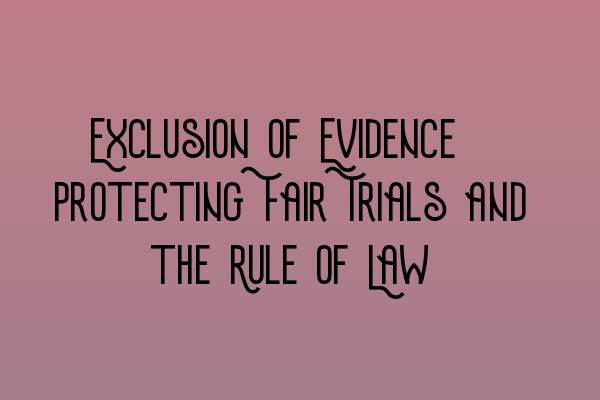Exclusion of Evidence: Protecting Fair Trials and the Rule of Law
Welcome to the SQE Criminal Law & Practice Law UK blog. In today’s post, we will dive into the important topic of exclusion of evidence. The exclusionary rule is a fundamental principle in criminal law that is designed to protect fair trials and uphold the rule of law. Understanding this concept is crucial for any aspiring criminal lawyer preparing for the SQE exams.
What is Exclusion of Evidence?
The exclusion of evidence refers to the suppression or exclusion of certain evidence from being presented in court due to constitutional violations or procedural errors. This rule is based on the principle that evidence obtained in violation of an individual’s rights should not be used to secure a conviction. It aims to prevent unfair trials and ensure the integrity of the criminal justice system.
There are several grounds for the exclusion of evidence, including:
- Unlawful search and seizure: When evidence is obtained through an unreasonable search or seizure in violation of the Fourth Amendment.
- Coerced confessions: If a confession is obtained through coercion, threats, or promises, it may be excluded from trial.
- Violation of Miranda rights: If a suspect’s Miranda rights are not properly read or respected during an interrogation, any resulting statements may be excluded.
- Chain of custody issues: If there are doubts about the integrity or continuity of the physical evidence, it may be excluded.
Role in Protecting Fair Trials
The exclusion of evidence plays a crucial role in protecting the fairness of trials. It helps prevent the use of unreliable or unlawfully obtained evidence, ensuring that defendants are not unfairly disadvantaged. By excluding such evidence, the court ensures that the trial process is conducted in accordance with the principles of justice and the rule of law.
Furthermore, the exclusionary rule acts as a deterrent against police misconduct and violations of individuals’ rights. Law enforcement officers are incentivized to adhere to proper procedures during investigations, knowing that any evidence obtained through unlawful means may be deemed inadmissible.
Challenges and Controversies
While the exclusion of evidence serves an important purpose, there are ongoing debates surrounding its application and scope. Critics argue that the exclusionary rule may sometimes result in guilty individuals going free due to technicalities, hampering the pursuit of justice. Others contend that excluding evidence is necessary to maintain the integrity and credibility of the justice system.
As aspiring criminal lawyers, it is essential to understand the complexities and nuances surrounding the exclusion of evidence. This knowledge will not only be beneficial for the SQE exams but also equip you to navigate its practical implications in your future legal career.
Conclusion
In conclusion, the exclusion of evidence is a vital aspect of criminal law that protects fair trials and upholds the rule of law. By excluding evidence obtained through constitutional violations or procedural errors, the court ensures the integrity of the criminal justice system while deterring police misconduct. Aspiring SQE candidates should familiarize themselves with this concept and its various grounds to excel in their criminal law studies and future legal practice.
For more information on SQE-related topics, check out these related articles:
- SQE 1 Practice Exam Questions
- SQE 1 Practice Mocks FLK1 FLK2
- SQE 2 Preparation Courses
- SQE 1 Preparation Courses
- SRA SQE Exam Dates
Thank you for reading. Stay tuned for more informative posts from SQE Criminal Law & Practice Law UK.
